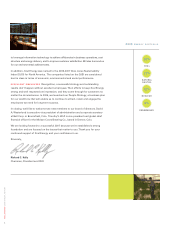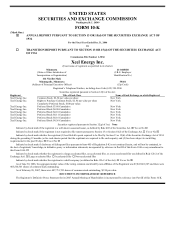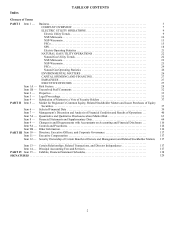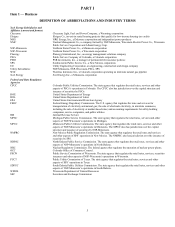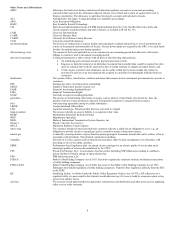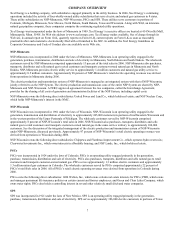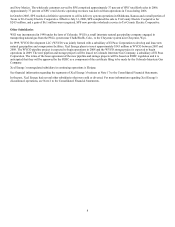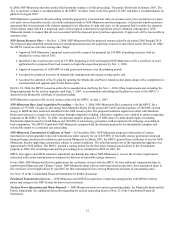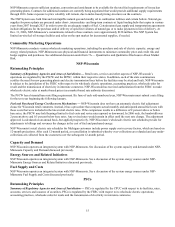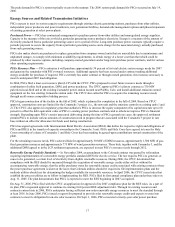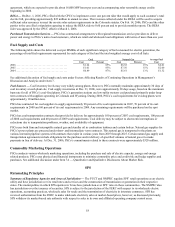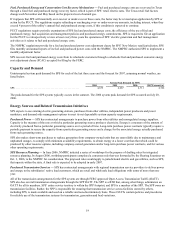Xcel Energy 2006 Annual Report Download - page 20
Download and view the complete annual report
Please find page 20 of the 2006 Xcel Energy annual report below. You can navigate through the pages in the report by either clicking on the pages listed below, or by using the keyword search tool below to find specific information within the annual report.10
imposition of financial or other penalties for violations of adopted standards. The FERC has issued proposed rules to make 83
ERO reliability standards mandatory and subject to potential financial penalties for non-compliance to be effective June 1,
2007;
• Adopting rules to implement changes to the Public Utility Regulatory Policy Act to allow utility ownership of QFs and
strengthening the thermal energy requirements for entities seeking to be QFs;
• Proposing rules that would allow a utility to seek to eliminate its mandatory QF power purchase obligation for utilities in
organized wholesale energy markets such as MISO; and
• Adopting rules to establish incentives for investment in new electric transmission infrastructure.
While Xcel Energy cannot predict the ultimate impact the new regulations will have on its operations or financial results, Xcel Energy
is taking appropriate actions that are intended to comply with and implement these new rules and regulations as they become effective.
Electric Transmission Rate Regulation — The FERC also regulates the rates charged and terms and conditions for electric
transmission services. FERC policy encourages utilities to turn over the functional control over their electric transmission assets and
the related responsibility for the sale of electric transmission services to an RTO. NSP-Minnesota and NSP-Wisconsin are members of
the MISO. SPS is a member of the SPP. Each RTO separately files regional transmission tariff rates for approval by FERC. All
members within that RTO are then subjected to those rates. PSCo is currently participating with other utilities in the development of
WestConnect, which would provide certain regionalized transmission and wholesale energy market functions but would not be an
RTO.
Centralized Regional Wholesale Markets — FERC rules require RTO’s to operate centralized regional wholesale energy markets.
The FERC required the MISO to begin operation of a “Day 2” wholesale energy market on April 1, 2005. MISO uses security
constrained regional economic dispatch and congestion management using locational marginal pricing (LMP) and FTRs. The Day 2
market is intended to provide more efficient generation dispatch over the 15 state MISO region, including the NSP-Minnesota and
NSP-Wisconsin systems. SPP received FERC approval to initiate an Energy Imbalance Service (EIS) market, which will provide a
more limited wholesale energy market that will affect the SPS system. The SPP EIS market commenced on Feb. 1, 2007.
NSP-Minnesota
Ratemaking Principles
Summary of Regulatory Agencies and Areas of Jurisdiction — Retail rates, services and other aspects of NSP-Minnesota’s
operations are regulated by the MPUC, the NDPSC and the SDPUC within their respective states. The MPUC has regulatory authority
over aspects of NSP-Minnesota’s financial activities, including security issuances, property transfers, mergers and transactions
between NSP-Minnesota and its affiliates. In addition, the MPUC reviews and approves NSP-Minnesota’s electric resource plans for
meeting customers’ future energy needs. The MPUC also certifies the need for generating plants greater than 50 MW and transmission
lines greater than 100 KV.
The MPUC is also empowered to select and designate sites for new power plants with a capacity of 50 MW or more and wind energy
conversion plants with a capacity of five MW or more. It also designates routes for electric transmission lines with a capacity of 100
KV or more. No large power plant or transmission line may be constructed in Minnesota except on a site or route designated by the
MPUC. The NDPSC and SDPUC have regulatory authority over the need for certain generating and transmission facilities, and the
siting and routing of certain new generation and transmission facilities in North Dakota and South Dakota, respectively.
NSP-Minnesota is subject to the jurisdiction of the FERC with respect to its wholesale electric operations, accounting practices,
wholesale sales for resale and the transmission of electricity in interstate commerce. NSP-Minnesota has received authorization from
the FERC to make wholesale electric sales at market-based prices (see market-based rate authority discussion) and is a transmission-
owner member of the MISO.
Fuel, Purchased Energy and Conservation Cost Recovery Mechanisms — NSP-Minnesota’s retail electric rate schedules in
Minnesota, North Dakota and South Dakota include a FCA that provides for monthly adjustments to billings and revenues for changes
in prudently incurred cost of fuel, fuel related items and purchased energy. NSP-Minnesota is permitted to recover these costs through
FCA mechanisms individually approved by the regulators in each jurisdiction. The FCA mechanisms allow NSP-Minnesota to bill
customers for the cost of fuel and fuel related costs used to generate electricity at its plants and energy purchased from other suppliers.
With NSP-Minnesota’s participation in the MISO Day 2 market, questions were raised regarding the inclusion of certain MISO
charges in the FCA. However, in December 2006, the MPUC authorized FCA recovery of all MISO Day 2 charges, except certain
administrative charges, which NSP-Minnesota is partially recovering in base rates and partially deferring for future recovery. In
general, capacity costs are not recovered through the FCA. NSP-Minnesota’s electric wholesale customers also have a FCA provision
in their contracts.


